Traveling between China and Germany in the time of COVID-19 Outbreak
During the time of the Coronavirus outbreak and its spread between January and March 2020, my husband and I flew back to China from Frankfurt Airport (January 8, 2020) and returned to Germany (January 31, 2020). Until now, I have experienced the same issue (the Coronavirus crisis) in two different countries. I would like to share this experience with you.
In December 2019, my husband and I were informed by our parents that we must come back to China for our wedding before January 16, 2020. At that time, I was preparing my PhD defence while my husband was working hard in order to get ahead on his workload to make sure that he could have his holiday break during January 2020. I was so happy to pass my defence in GSSC on January 7, 2020. The next day, we started our journey to Shanghai.
Our wedding was split into three parts: the first part was scheduled on January 18, 2020 at a hotel in Suzhou City where my parents-in-law live. The second part was on January 20, 2020 in my home village in Guangxi, and the third one was on January 22, 2020 in Qinzhou City where my parents live. All three parts took place at the start of the COVID-19 outbreak in Wuhan City, and before the lockdown of Wuhan City on January 23, 2020. Since the lockdown of Wuhan City, with strict quarantine measures to contain the Coronavirus implemented, residents of China have been isolated from each other.
On the evening of January 20, 2020, Dr. Zhong Nanshan, the Chinese government’s senior medical adviser accepted an online interview and made clear that “it is now certain that the new virus appears to be spreading from person to person.” He then gave three pieces of advice to people. Firstly, nobody should go to Wuhan City without any special reasons. Secondly, in case of a cold, go to a clinic. Thirdly, surgical masks should be worn when going out.[1] Dr. Zhong was the expert who was trusted the most by the Chinese public, since many experts and local government officers were hiding the truth in the very beginning. He was also a Chinese epidemiologist and pulmonologist who discovered the SARS Coronavirus in 2003.[2] Since the interview, the people have paid significant attention to the news of the Coronavirus. Measures to control and stop the spread of infection have been taken in China.
On January 23, 2020, my husband and I flew back to Suzhou City to celebrate the eve of the Lunar New Year (24th) with my parents-in-law because it is the custom for married women to celebrate the Spring Festival in their husband´s home. After January 23, many provinces launched a first-level response mechanism for major public health emergencies. My village, located on a remote mountain, was locked down on January 26, 2020. “Cancel all collective activities in the villages” was the new policy in rural areas. The government officers instructed the head of the villages that outsiders, including relatives of village households, were forbidden to enter the village. A checkpoint was set up at each village´s entrance. Three or four villagers with one local doctor were required to check the temperature of each outside visitor before he or she could enter the village.
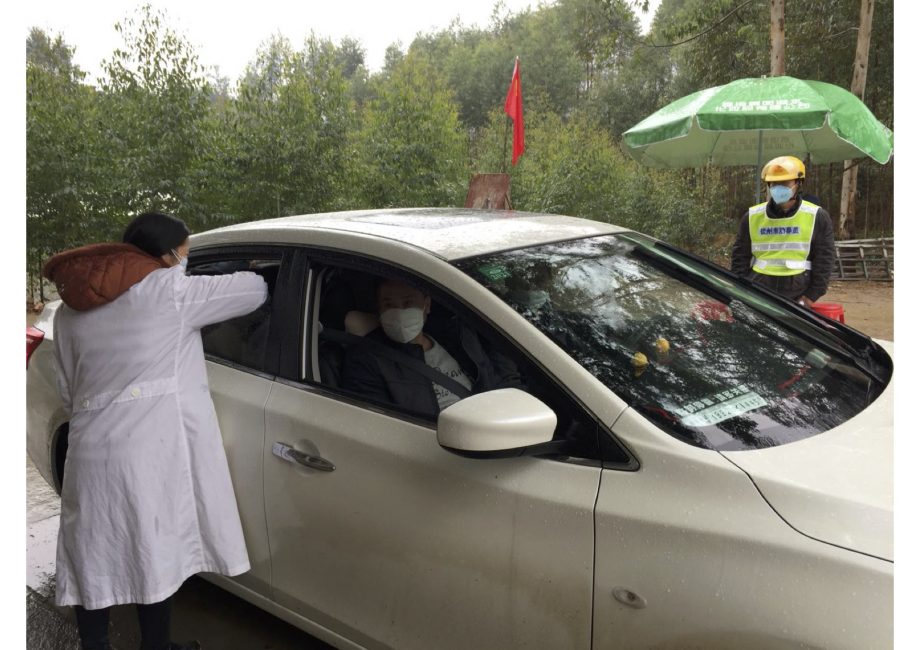
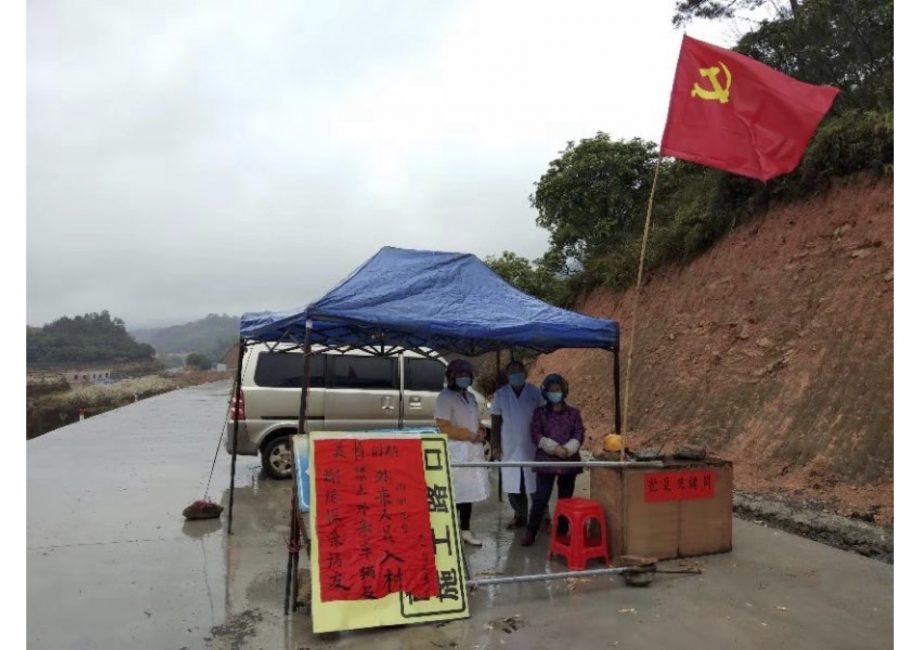
Different checkpoints in Qinzhou City on February 20, 2020. Source: Hongdong Huang, usage with friendly permission by the author.
In Qinzhou City, movements of the residents in each community were checked daily by the community staff and government officers. The strict quarantine measures taken to contain the Coronavirus were the most important actions taken to deal with the crisis of the COVID-19 pandemic. One person in each family was permitted to go out for shopping for only two hours per day. Additionally, there were three basic requirements that everyone going outside had to follow: 1) obtain a permission letter with personal information from the community office, 2) wear a facemask, and 3) measure temperature.
My father was the one in our family who did this daily shopping. Like many elderly persons in China, he did not like wearing a facemask. “Wearing a mask is highly uncomfortable,” he said. However, in order to go shopping and protect himself and the family, he agreed to wear a mask and sticked to the rule for preventing the spread of the disease. Without a facemask, he could not go outside, and would not be allowed to enter any shop or market.
However, it was not easy to buy a facemask in China. Many people made “masks” of their own. My sister and I had visited many medical shops (similar to Apotheken in Germany), but the staff said there were no facemasks.
Digital management was commonly used to govern the movement of the people. People scanned the QR code when they were entering and leaving the market. This was the major market in the city and my father bought food there.
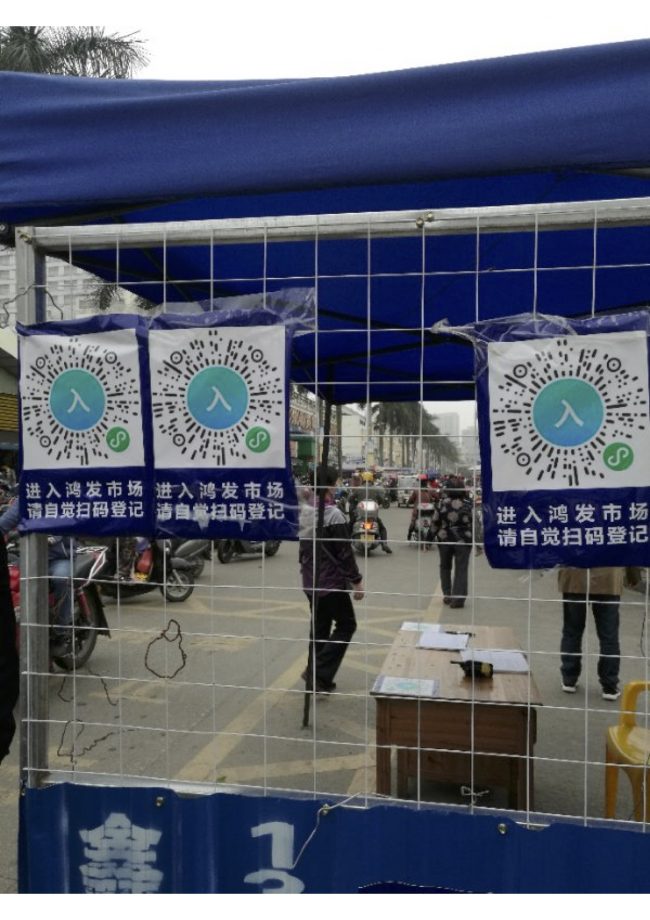
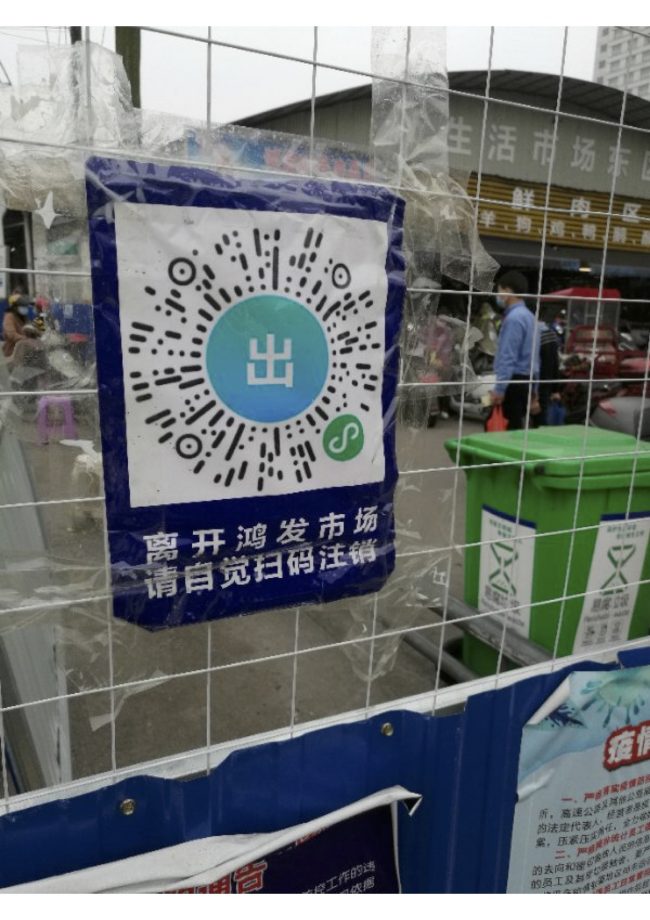
QR code for WeChat, on display in Hongfa Market in Qinzhou City, March 20, 2020. Source: Zhang Jinghua, usage with friendly permission by the author.
In Suzhou City, we celebrated the Lunar New Year. The city was rather empty, as many migrant workers had gone back home for the Spring Festival. This is the most important festival in the year for the majority of people, and it is when families get together and celebrate the advent of spring in China. This year was different. We had learned from social media that many people, including doctors were infected by COVID-19. In the beginning, people panicked because of the consistent bad news: the hospitals lacked medical masks, goggles, and gowns. Sick people were dying, and the hospitals were full of infected people. Some of the sick had to lie on the ground due to the shortages of doctors and nurses.
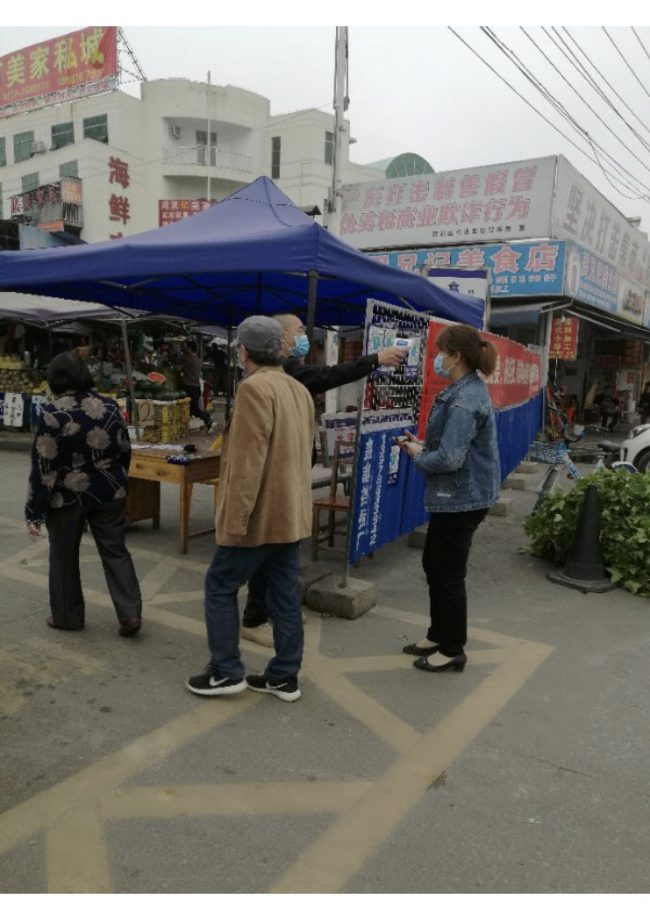
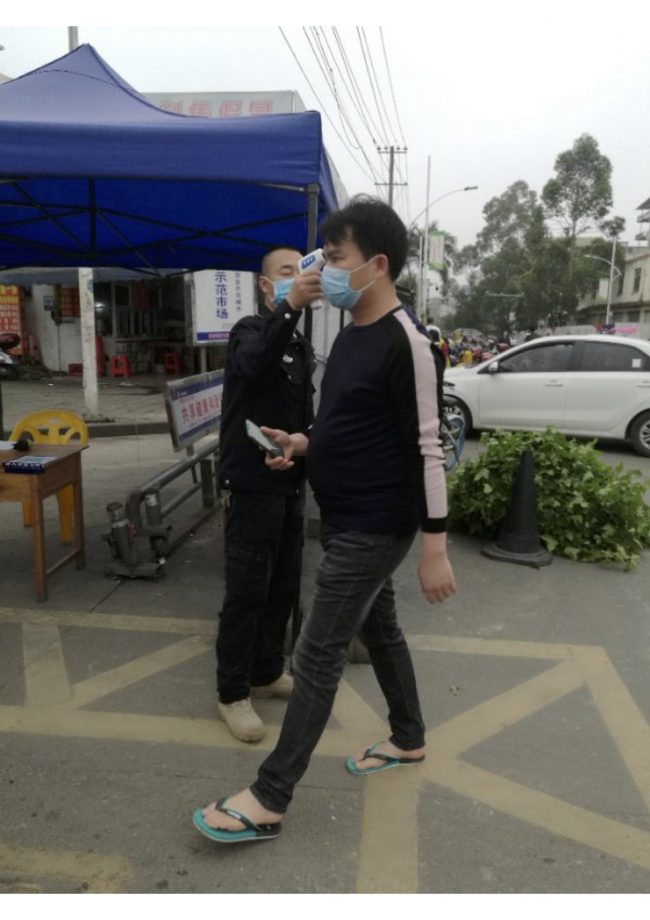
People get their temperature measured before entering a market. Source: Zhang Jinghua, usage with friendly permission by the author.
Four things have been done to rescue the doctors and save the sick people: Firstly, overseas Chinese citizens have actively bought all needed medical materials abroad, including surgical facemasks, and donated them to hospitals and communities in China. These contributions helped to solve the shortage of medical supplies needed to fight the Coronavirus. Many of the Chinese citizens living overseas also sent facemasks to their families and friends in China. Secondly, two new hospitals were built to fight the Coronavirus in the centre of China’s Wuhan City. Thirdly, each province in China sent a team of doctors and nurses to help this city in Hubei Province, which solved the problem of the lack of doctors and nurses. Fourthly, the strong influence of social media helped prevent the spread of the illness, and food sent in from other provinces helped the people in Wuhan City and other cities in Hubei Province.
“Sleeping the whole day is the best contribution for the country,” was the most popular slogan on social media. Staying at home was a big challenge for many families. Kids were not allowed to go to school or even go outside their homes. Parents were not going to work and were not doing anything special. The festival holiday was postponed by the government in order to avoid travel and the risk of spreading the infection. Until now (March 28, 2020), the schools are still closed in most provinces in China.
Basically, we obeyed the rules and stayed at home. I went for a walk and saw only a few people on the way. A few shops were open on January 28, 2020. During the long holiday, we only met one friend for a cup of coffee before we returned to Germany on January 31, 2020. Before entering the café, a worker took our temperature and told us to wash our hands with disinfectant. There was also a note on the table with a written reminder: “Only take off your mask when you eat or drink.” The café was located in a big shopping mall. The shopping mall was almost empty, since fewer and fewer people were coming to shop. It was different from when I first visited it two weeks before. Back then, the mall was very crowded with people who were preparing for the festival.
Many roads and highways were closed in the end of January. As a result, going to the airport was a big challenge. Even though we were told that the highway leading from where we stayed to Shanghai Pudong airport was likely to be closed, we still wanted to try to drive there ourselves. We thought that we could go in the early morning when there were fewer cars on the way to the airport. Fortunately, the highway we had chosen was open and we had a smooth drive to the airport. Before entering Shanghai, police and doctors were working in the highway toll station measuring all motorists’ temperatures as they were coming into Shanghai. “If a person’s temperature was higher than 37.3 degrees, he/she must be isolated and cannot go abroad.” Temperatures were taken again before entering the airport. After check-in, we wrote down our personal information and health situation on a health card and submitted it to the airport staff before passing through security.
During the eleven hours from Shanghai to Frankfurt, all passengers wore facemasks, and only took them off when having a meal. We looked forward to arriving in Frankfurt. When we landed in Frankfurt, I was so excited and relieved. This trip was the most difficult one that I have ever taken.
In Germany, people do not wear any masks. However, my husband’s company did not allow him to go to work. The company brought him his computer before we arrived home. He then worked from home due to the two-week self-quarantine rule. Unfortunately, both of us caught a cold at that time and we visited a doctor. He said that we were fine and if we had a temperature higher than 38 degrees, we must go directly to the hospital. We recovered after three weeks. My husband went back to work on February 24, 2020. Carnival was taking place in Cologne and some bad news emerged on 25th and 26th of February, 2020 and we heard that people tested positive for the Coronavirus.
In the past four weeks, the COVID-19 situation has changed dramatically. More and more people have been infected, and the number of cities with many infected inhabitants is increasing. On 17 March, my husband had to work from home again, but this time it was triggered by the Coronavirus outbreak in Germany. On March 19, 2020, my mother sent me a message through WeChat: “How are you two doing? I have learnt that the Coronavirus is rapidly spreading in Germany. Do not go out. Eat what you have at home. You must know that we could do the same in a country with 1.4 billion people. And now the kids will return to school soon. You also can do the same. No partying, shop less and keep exercising.” My mother was so serious, and I was a bit nervous due to the many concerns that were raised by my family, relatives, and friends. Some friends asked me about the current situation and told me to wear a mask if I need to go out. Some relatives told me not to go to any crowded places and that it will be better for me to go back to China. I have learnt that some Chinese friends have flown back to China, but many have stayed.
China has sent some doctors to more and more countries to help them save more lives and share the experience of how to stop the spread of Coronavirus to the world. Significantly, China has also donated medical masks and respirators to many countries. Some traditional Chinese medicine has been used to prevent and heal the CODID-19 patients. In Germany, the Chinese communities have donated some required medical materials to hospitals, supermarkets, and some German friends. Some Chinese organizations donated the first facemasks to Heinsberg on March 13, 2020.
I hope that, with the cooperation of residents, the governments of countries where COVID-19 has severely impacted lives will be able to deal with the crisis more effectively and efficiently. Then, everyone will be able to live a normal life again.
Written on March 25, 2020
Qian Zhu finished her Ph.D at the department of Social and Cultural Anthropology, University of Cologne, in January 2020 with the support of the Global South Studies Center (GSSC). She holds two MA degrees, one of them in ‘Culture and Environment in Africa (CEA)’ at University of Cologne, the other one in ‘ Ideological and Political Education’ at Guangxi Normal University in China. She is currently running a research project (No. YNUXG-013) funded by the University of Yunnan, Yunnan Province, China.
References
[1] Zhong Nanshan talks about the prevention and treatment of the new pneumonia, confirming human-to-human transmission of new Coronavirus (钟南山谈肺炎防治, 新型冠状病毒存在人传人现象). https://news.china.com/socialgd/10000169/20200121/37728574.html. 21. January 2020.
[2] “Editor-in-Chief: Prof. Dr. Zhong Nanshan, MD”. Journal of Thoracic Disease. Archived from the original on 17 July 2013. Retrieved 18 July 2013.































